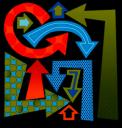The Cognition of Your Inner Compass
Friday, August 21st, 2009 We move around a lot and so supporting the cognition of how we navigate in a new environment for work and fun has become a big business. GPS navigation systems, location-based games and virtual roadside tours are just a few examples.
We move around a lot and so supporting the cognition of how we navigate in a new environment for work and fun has become a big business. GPS navigation systems, location-based games and virtual roadside tours are just a few examples.
Opportunities for clever cognitive designers are endless. For a good review of the cognitive science behind getting lost and finding our way, check out the brief article, Why Humans Can’t Navigate Out of a Paper Bag in the New Scientist. Some of the findings include that we have:
* A very weak ability (especially compared to animals) to judge distances and direction accurately.
 * A strong capacity to imagine that we are someplace else.
* A strong capacity to imagine that we are someplace else.
* Mental maps built up to helps navigate an environment that can be inflexible and thwart our attempts to reorient.
* Fail to be mindful and ignore unique features in the landscape or other queues.
 The article also addresses the emotional and visceral dimension of losing our way. Fear of getting lost is like the fear of public speaking. It can be so intense that some individuals refuse to leave their homes or familiar surroundings.
The article also addresses the emotional and visceral dimension of losing our way. Fear of getting lost is like the fear of public speaking. It can be so intense that some individuals refuse to leave their homes or familiar surroundings.
This is an important finding for cognitive designers as there are many service experiences that involve a little navigation and therefore could easily trip over the fear of getting lost.